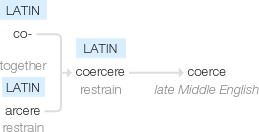Coercion
late Middle English: from Latin coercere ‘restrain’, from co- ‘together’ + arcere ‘restrain’.
wiktionary
From Old French cohercion, from Latin coercitiō(“magisterial coercion”), from coercere, past participle coercitus(“to restrain, coerce”), from cum(“with”) + arceō(“to shut in, enclose”); see coerce.
etymonline
coercion (n.)
early 15c., cohercioun, "compulsion, forcible constraint," from Old French cohercion (Modern French coercion), from Medieval Latin coercionem, from Latin coerctionem, earlier coercitionem, noun of action from past-participle stem of coercere "to control, restrain" (see coerce).
It defies the usual pattern where Middle English -cion reverts to Latin type and becomes -tion. Specific sense in reference to government by force, ostensibly to suppress disorder, emerged from 19c. British policies in Ireland. "As the word has had, in later times, a bad flavour, suggesting the application of force as a remedy, or its employment against the general sense of the community, it is now usually avoided by those who approve of the action in question" [OED].
